The OCZ Vertex 4 line, including the Vertex 4 256GB recently received another firmware update. Keen readers will remember performance was increased significantly with firmware v1.4. Today we are looking at firmware v1.5 to see if there was a similar performance update. As a quick spoiler, across benchmarks, there is an improvement with the new solid state drive firmware, although not as big as we saw with v1.3 to v1.4. The 4K low queue depth benchmarks seem to have been sacrificed for this speed enhancement though. Let’s look at some quick benchmarks below.
Test Configuration
I am using a Sandy Bridge test bed here as the Cougar Point SATA 6.0gbps controller is perhaps the best 6.0gbps SATA controller on the market at the moment.
- CPU: Intel Core i5-2500K
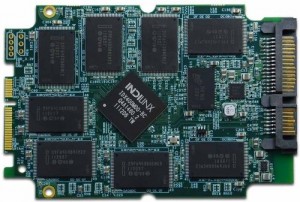
OCZ Vertex 4 Indilinx - Motherboard: ASUS P8H67-M EVO
- Memory: 8GB 1600MHz CL9 DDR3 (4x2GB)
- OS Drive: OCZ Agility 2 120GB
- Additional Drives: OCZ Vertex 4 256GB
- Additional NICs: Intel Gigabit CT PCIe x1 network adapter
- Enclosure: Supermicro SC731i-300B
- Power Supply: Supermicro 300w (included in the SC731i-300B)
As with any modern SSD, set the controller to AHCI mode or RAID mode for best performance. Also, installing the Intel RST 10.xx series drivers over the default Windows 7 drivers showed a nice performance gain so I do recommend it for solid state drive users on Intel chipsets.
Updating Firmware
OCZ has put some effort into making SSD firmware updates much easier than in the past. I still remember burning CD-R media with a DOS image, a firmware update tool and a firmware package then hunting for the correct drive only after setting the controller and jumper correctly. My how times have changed for solid state drive updates!
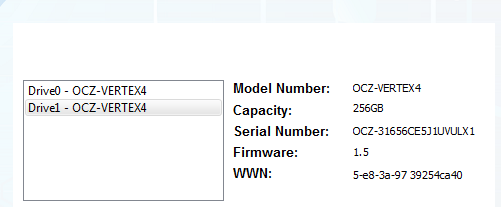
The updates were:
Enhancements:
- Improved sequential file transfer performance for 128GB, 256GB and 512GB models
- Optimized idle garbage collection algorithms to extend the benefits of performance mode by enabling the feature across a greater percentage of the drive
- Improved HBA / RAID card compatibility
- Further improved compatibility with desktop and mobile ATA security features
Fixes:
- Corrected a corner case issue where the ‘Remaining Life’ SMART attribute could be reported incorrectly
Let’s see how the new firmware performs.
The Tests
It is important, especially with SSDs not to take a single test result at face value. One should look at a few different tests to get an idea of how the drives perform in different scenarios. To this end, AS SSD benchmark, CrystalDiskMark, ATTO and HD Tune Pro all show different facets of performance.
AS SSD Benchmark
AS SSD is a solid benchmark that does not write compressible data to drives. The result is perhaps one of the best workstation SSD benchmarks available today.
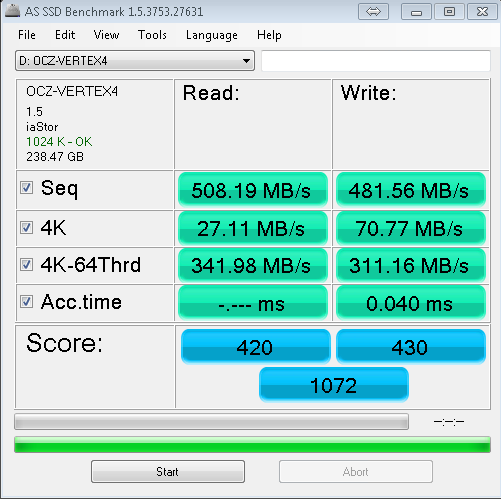
AS SSD saw sequential read speeds rise by about 13MB/s and sequential write speeds raise by 24MB/s. 4K speeds saw reads slightly improve and writes slightly decrease. On the 4K 64 thread tests speeds were fairly similar with firmware v1.5 slightly edging out firmware v1.4 and nearly reaching 80K IOPS during writes (reads were just over 87K.)
CrystalDiskMark
CrystalDiskMark is another benchmark which gives non-compressible read/write numbers. This is in contrast to the ATTO Benchmark used by LSI/ Sandforce and its partners when they market a given solid state drive.

CrystalDiskMark saw some nice performance gains. Sequential reads and writes are now around 500MB/s up from around 470MB/s and there were gains at 512K as well. It should be noted that the 4K write speeds were down around 10MB/s versus fw v1.5 and the 4K queue depth 32 speeds are up ever so slightly with the new firmware as well. Overall, out of the eight CDM boxes, only one showed a decrease in speed.
ATTO Benchmark
The ATTO Benchmark shows some fairly strong performance, I will note that the value of the ATTO benchmark is really to show the best-case scenario. ATTO is known to write highly compressible data to drives, which inflates speeds of controllers that compress data like SandForce does prior to writing on a given solid state drive.
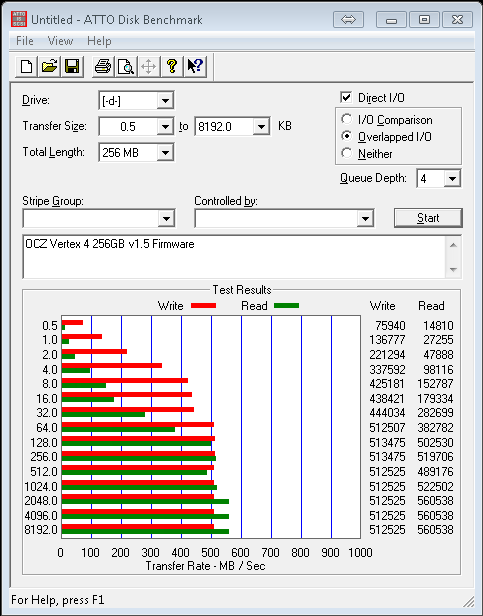
ATTO results finally peaked above 500MB/s with write speeds peaking at 513MB/s compared to 467MB/s with firmware v1.4. Read speeds are now up to 560MB/s whereas they previously peaked at 546MB/s with firmware v1.4. I do want to note that the dip at 512K occurred on both of my OCZ Vertex 4 256GB units that had firmware v1.5 and across multiple runs per drive.
HD Tune Pro
HD Tune and its Pro version have been longstanding disk drive benchmarks. I started including the basic benchmark in reviews since I do test a mix of hard drives and solid state drives.
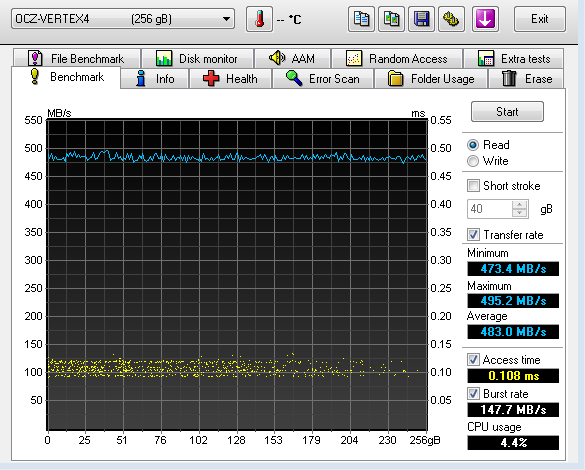
Here we see minimum up 12MB/s, maximum up 14MB/s and average up 13MB/s. Over the course of the runs 13MB/s improvement seemed standard. Access times also fell slightly across all tests.
Conclusion
Overall it appears as though version 1.5 of the OCZ Vertex 4 256GB was not as dramatic of an improvement as we saw with the version 1.3 to version 1.5 update. It does appear as though OCZ has detuned the 4K numbers to get more marketable sequential numbers that are competitive with LSI SandForce offerings. I think this is a shame since there is a lot of small file size low queue depth workload out there and where the difference is very noticeable.




Patrick,
Any chance you could also run the Anvil Storage Utilities benchmark as a comparison?
Current version is RC3 http://www.ssdaddict.com/apps/AnvilBenchmark_RC3.zip
I will start using Anvil soon. Been in the plan but need to get it executed.
Can you compare the performance with 50%/75%/90% of the drive full?
Why is everyone so obsessed with synthetic benchmarks, can you post up file copy tests, game level load times, extract winrar files. Things people are really interested in.
File copy tests are generally sequential reads/ writes no?
I think you were the first one with performance numbers on the new firmware.